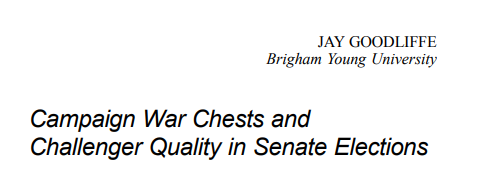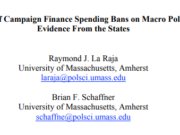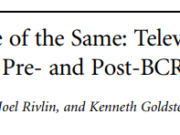This article examines whether or not Senate incumbents can use war chests to affect their odds of winning. The author uses data on races from 1980 to 2000 to demonstrate the effect of an incumbent Senator’s war chest on a campaign. For the purpose of this article, the author defined war chest as the cash on hand an incumbent has 22 months before the election. The author finds that, on average, about half of a Senate incumbent’s war chest comes from the cash the incumbent saved from the previous election. Thus, an incumbent’s war chest may be a partial result of what happened in the previous election campaign. Ultimately, the author concludes that war chests do not have a strong effect on the type of challenger in U.S. Senate elections. Similar to recent studies of war chests in the U.S. House, this work fails to uncover any systematic evidence that war chests in Senate elections deter general-election challengers. Consequently, reforms aimed at eliminating war chests will do little to increase electoral competitiveness. Implementing such a reform would not decrease competitiveness either, since incumbents are not raising war chests for tough election battles but merely carrying leftover money from one election campaign to the next.
For further reading on this issue in other studies by Jay Goodliffe, see:
- “Campaign Fund-raising and Spending for Deterrence and Savings” (2009)
- “When do War Chests Deter?” (2005)
- “War Chests as Precautionary Savings” (2004)
- “The Effect of War Chests on Challenger Entry in U.S. House Elections” (2001)
- “Campaign Finance in U.S. House Primary and General Elections” (2001)














